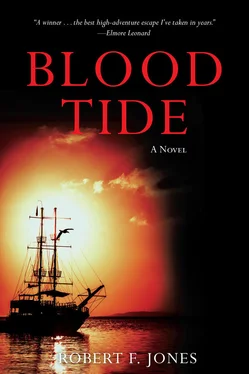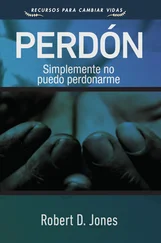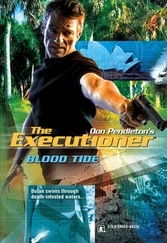Robert Jones - Blood Tide
Здесь есть возможность читать онлайн «Robert Jones - Blood Tide» весь текст электронной книги совершенно бесплатно (целиком полную версию без сокращений). В некоторых случаях можно слушать аудио, скачать через торрент в формате fb2 и присутствует краткое содержание. Год выпуска: 2014, Жанр: Старинная литература, на английском языке. Описание произведения, (предисловие) а так же отзывы посетителей доступны на портале библиотеки ЛибКат.
- Название:Blood Tide
- Автор:
- Жанр:
- Год:2014
- ISBN:нет данных
- Рейтинг книги:5 / 5. Голосов: 1
-
Избранное:Добавить в избранное
- Отзывы:
-
Ваша оценка:
- 100
- 1
- 2
- 3
- 4
- 5
Blood Tide: краткое содержание, описание и аннотация
Предлагаем к чтению аннотацию, описание, краткое содержание или предисловие (зависит от того, что написал сам автор книги «Blood Tide»). Если вы не нашли необходимую информацию о книге — напишите в комментариях, мы постараемся отыскать её.
Blood Tide — читать онлайн бесплатно полную книгу (весь текст) целиком
Ниже представлен текст книги, разбитый по страницам. Система сохранения места последней прочитанной страницы, позволяет с удобством читать онлайн бесплатно книгу «Blood Tide», без необходимости каждый раз заново искать на чём Вы остановились. Поставьте закладку, и сможете в любой момент перейти на страницу, на которой закончили чтение.
Интервал:
Закладка:
The letter was addressed to “Señorita Capitán M. Culdee, Port Albion, U.S.A.” It had been battered, bent, smudged, spindled, and mutilated in the course of its passage through half a dozen post offices from Honolulu to Kentucky to Oregon to northern California. The cancellation mark across the gaudy alien stamps read “Siquijor, P.I.” Of course, Miranda thought, the Philippines. Her hands began to shake.
“Dear Srta. Capitán,” the letter began in a spiky, old-fashioned script.
I am a friend of your former shipmate Sr. E. Pascal, who has asked me to write to you. He had indeed seen your vessel THE SEAMARK in Philippine waters, at Puerto Princesa on the island of Palawan. Sr. Pascal was there on seamanlike business but four months ago. The vessel, he tells me, was taking on stores and water. When he approached it, a fierce Dog would not permit him aboard but rather attacked so as to bite him. Sr. Pascal inquired of persons at the dockside and was pointed at a young man of American persuasions who Sr. Pascal has asked where are you? The young man said you were drowned dead overboard in Mexico many months since. Sr. Pascal was very much saddened at this evil report but when the young man bought him beer to drink Sr. Pascal must wonder if this news is true. The young man was very much vagrant (¿muy vago?) on this news and hasty for his departure so when Sr. Pascal received your mail message inquiring as to SEAMARK he was very lucky, contento. Please excuse my badly English but I am working long years here in Siquijor and Sulu Sea mainly among Moros and Sea Gipsy Badjaos who speak not your felicitous tongue. Sr. Pascal sends you his fond love and much affection and wants much to see you once more and help you in recovering your fine vessel SEAMARK. Sr. Pascal would write you by his own hand but has forgotten how to do it. God be with you.
It was signed “Padre Bartolomeo Cotinho, S. J., Misión San Ignazio, Siquijor Island, P.I.”
So there it was. Effredio Pascal had come through.
Miranda went first to the attic and opened her grandfather’s old sea chest, packed to its macramé-studded lid with charts and sailing directions covering the entire Pacific Ocean. They were hopelessly out of date, the most recent one published in 1938, but Miranda dug out a chart of the Philippines and carried it downstairs. Earwigs scuttled as she unrolled it, and the chart was badly gnawed around the edges, but she quickly found Siquijor. It lay due east of the south end of Negros Island, where Effredio had been born. Palawan, she saw, was a long, narrow island shaped like a dented, upside-down rifle. It lay, northeast to southwest, across the Sulu Sea less than four hundred miles west of Siquijor. Puerto Princesa appeared to be the island’s largest town, overlooking a wide, well-protected harbor on the island’s east coast. From there Curten could have gone north to Manila, or southwest to the tip of Palawan, then across the South China Sea to the Golden Triangle of Southeast Asia. Or he might have stayed in the Sulu Sea. It was full of islands—hundreds, thousands of them. Or he could have . . .
She stopped and smashed an earwig. Her heart was pounding. She had to slow down, think it through. She saw Culdee watching her from the deck.
“What is it?” he asked.
“ Seamark ,” she said. “A friend of mine—an old mate—he’s found her. Or seen her, anyway. Curten was still aboard her, and that dog of his, too.”
“Where was this?”
“Puerto Princesa. In the Philippines.”
Culdee turned away from her, back to his knots. He was laying up robands for the schooner’s yards and staysails. But his hands trembled. He got up angrily and headed for the kitchen. He had a bottle of rum in the reefer, she knew. He pulled away on it in there for a minute. Then he came back out to where she sat looking at the chart.
“The Philippines,” he said in a flat voice. He was looking down at her. He began humming an odd little tune. “What are you going to do?”
“Get out there,” she said. “Get my ship back from that bastard.”
Culdee started whistling the same tune, whistling up a wind she knew.
“What’s that song?”
“An old one from the Philippine insurrection,” he said. “‘I wanna go to the Filla-Pie-Neens, fight for my country and live on beans. I wanna go to the Filla-Pie-Noons, fight for my country and live on prunes.’ It goes on and on from there, however silly you want to make it.”
“Are you coming with me?”
“How?”
“In the schooner. She’s nearly ready now. I ran her down to the boatyard in Port Albion and stepped the masts yesterday, and I’ve got most of the rigging rove. She’s good as new. Shipshape and Bristol-fashion. You coming?”
“Christ, no,” he said. “My sailing days are over. I’m too old for that shit. No way. I hate that part of the world. Forget about it.”
That evening, toward sunset, Miranda rowed the dinghy out to where the schooner lay at anchor in the bay. Bare poles swung slow and naked against a red and black sky. The little ship lay trim on the water, her bowsprit raked sharp from the long, clean sheer of the main deck. The hull looked black in the failing light. Miranda tied up to the taffrail and rigged a bosun’s chair. With a brush and a bucket in hand, she hoisted herself and painted over the schooner’s name, Caprice .
Culdee watched from the captain’s chair.
When she finished and lowered herself back into the dinghy, he could make out the ship’s new name, in bold white capitals: VENGANZA.
“Vengeance,” he thought. “Payback,” but in Spanish. Appropriate. He uncorked the rum bottle, put the neck to his mouth, and tilted it toward the stars.
TEN

If Miranda had so far blown through the old estancia with the verve of a force nine gale, she now hit typhoon velocity. She hanked the schooner’s new suit of sails and ran out for sea trials, discovering that although it made her hustle like a Honolulu hooker, she could indeed single-hand the ship if she flew only the main and a headsail. That would cut her speed some, but once she got down to the trades she could hunt up a few deckhands. In the PI, Effredio was waiting and maybe some of her old shipmates would be on the beach somewhere along the way. She called the Philippine consulate in San Francisco and learned that as a U.S. citizen she didn’t need a visa, so long as she stayed in the Philippines only three weeks. Later, if need be, she could extend it.
Provisioning was a problem. She didn’t have much money—a little over twelve hundred dollars from the sale of the catboat, and most of it would go for diesel fuel to drive the Graymarine auxiliary—there were doldrums down that course. She invested more than she cared to on canned meats, flour, and baking soda, then baked up a supply of hardtack and stowed it in the old ship’s biscuit tins that she found in the schooner’s galley. Not enough to last the voyage, but maybe she’d get lucky along the way. Her luck seemed to be turning now.
Antiscorbutics? With fair winds and a boost from the currents she was only a few weeks from Hawaii, where guavas rotted in the gutters, but she laid out a few more bucks at the health food store in Port Albion for a brown-glass bottle of generic Cs and two gallons of fortified lemon juice. It would go well with the tea she’d already stowed.
Pubs and charts? In a used-book store near Vallejo she found the U.S. Defense Mapping Agency’s Sailing Directions (Enroute) for the Philippines , volumes I and II, all updated through the previous year, along with matching charts. After long hesitation, she sunk another three bucks on a coffee-stained, rat-chewed copy of The Philippine Pilot . Thank God she was born to a seagoing family: she had salvaged her grandfather’s old sextant, barometer, and stopwatch while cleaning house last winter. The schooner’s old brass-plated clock kept accurate time if you wound it regularly—she checked it against a time hack on the marine band. Anyway, she knew the wind and stars down there.
Читать дальшеИнтервал:
Закладка:
Похожие книги на «Blood Tide»
Представляем Вашему вниманию похожие книги на «Blood Tide» списком для выбора. Мы отобрали схожую по названию и смыслу литературу в надежде предоставить читателям больше вариантов отыскать новые, интересные, ещё непрочитанные произведения.
Обсуждение, отзывы о книге «Blood Tide» и просто собственные мнения читателей. Оставьте ваши комментарии, напишите, что Вы думаете о произведении, его смысле или главных героях. Укажите что конкретно понравилось, а что нет, и почему Вы так считаете.












